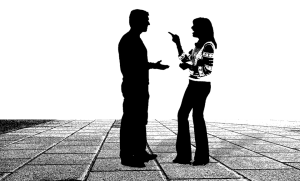
Albert Merhabien, the famed communication researcher, stated that nonverbal communication makes up almost 93 percent of all the “messages” we receive from other individuals. Others suggest that it is actually more like 60 percent to 70 percent of nonverbal communication that lets us know what others are really feeling.
What we know about how the brain and body work is that all thoughts and feelings are ways that we cope with surviving in our world and that, for many of us, not revealing our feelings and instead holding them back may be the “safe” way to cope with others at work, at home and in general.
Inside The Brain
What is also well understood is that there are “tells,” or neurological expressions of these withheld, nonverbal communications, that are going on inside of our brains. Even though we may not consciously or intentionally express verbally or physically how we feel, our brain/body connection does express these thoughts and feelings in nonverbal ways. These nonverbal ways are the “tells” that police and other professionals use to decide if someone is withholding information.
Many studies have been done on the subject of body language and nonverbal communication. It is important for all of us to become aware of how our physical and verbal or nonverbal behavior impacts others, especially those who spend the most time in our environment.
Nonverbal communication can often cause one individual in a relationship to become upset if he feels he is seeing or interpreting nonverbal actions by his partner as being rejecting or disinterested. Often, before a relationship breaks up, one partner suspects the relationship is in trouble because of a lack of eye contact or verbal communication or because of hostile body language, such as the crossing of arms or legs, in response to communication attempts.
Scientific Insights
There is a science to nonverbal communication interpretation, as well as a science to understanding the best way to express our feelings and how the way we do that can result in a positive or negative outcome. The science is directly related to neurological and neurotransmitter connections between thoughts and feelings in the brain and their communication to the muscles and nerves in the rest of our body.
If you would like more information on this subject, you can download a free chapter from Changing Behavior: Immediately Transform Your Relationships with Easy to Learn Proven Communication Skills by going to www.changingbehavior.org.
FREE Whole Health Consultations available.
888-354-4325 Take charge of your health


 In our consumer-driven environment, we are invited daily to buy, buy, buy and can find ourselves living with closets, attics and basements overflowing with “stuff.” Much of this stuff we do not even use and may not even remember we have.
In our consumer-driven environment, we are invited daily to buy, buy, buy and can find ourselves living with closets, attics and basements overflowing with “stuff.” Much of this stuff we do not even use and may not even remember we have.
